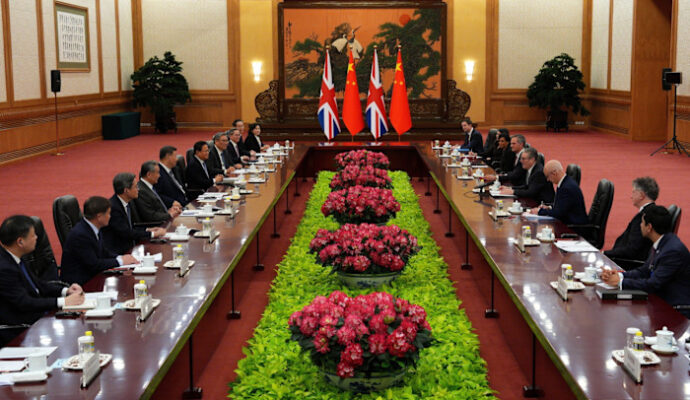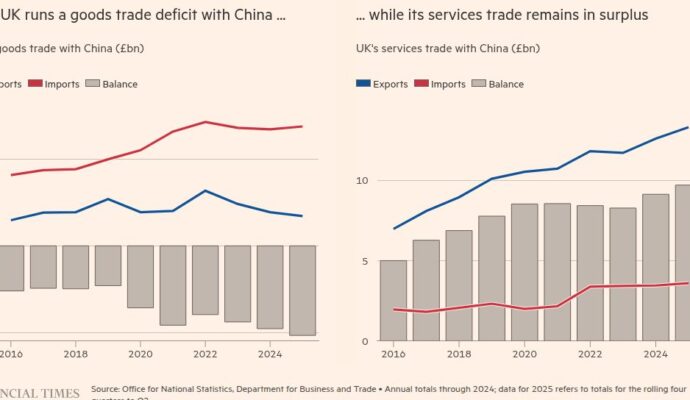In a sign of China’s expanding international influence, South Africa has downgraded the status of Taiwan’s liaison office in the country, further diminishing the democratic island’s diplomatic footprint, experts say.
South Africa severed formal diplomatic ties with Taiwan in 1997 and recognized Beijing as the government of China. But in the nearly three decades since, it has retained unofficial ties with Taipei and a trading relationship.
However, it’s recently moved to diminish Taiwan’s unofficial status in the country. South Africa’s Department of International Relations and Cooperation now categorizes the Taiwan Liaison Office – which functions as a de facto embassy but without official diplomatic status – as a “Taipei Commercial Office” on its official website, and has removed the name of the Taiwanese Representative Oliver Liao under the listing.
On Friday, Taiwanese Foreign Minister Lin Chia-lung accused China of putting pressure on South Africa to make the changes. He said the liaison office had requested negotiations with the South African government about it.
Analysts told Radio Free Asia that the changes highlight China’s continued efforts to use its influence in Africa and the Global South – a diverse set of countries across Africa, Latin America, Asia and Middle East – to prevent Taiwan from gaining international recognition and to hurt its ability to pursue its diplomatic interests abroad.
“Taiwan’s representative offices are its way to make its voice heard diplomatically, in the face of declining official recognition. But China’s deep pockets and military aggression have left quite a mark on smaller, developing nations,” Anushka Saxena, China analyst at Bengaluru, India-based think tank Takshashila Institution, said.
China claims Taiwan as part of its territory and maintains that the self-ruling island has no right to independent diplomatic relations.
As it is, Taiwan retains formal ties with only a dozen countries, mostly smaller and less developed nations. In that context, even nominal changes in recognition by foreign governments send a strong signal to Taipei.
Last October, the South African government announced that Taiwan’s liaison office would be “rebranded” as a trade office and said the same change would be effected for the South African liaison office in Taipei.
Under its foreign representation listing section on the website, the South African government now shows the address of the Taiwan liaison office as being in the nation’s economic hub Johannesburg, not the administrative capital Pretoria, although Taiwanese Foreign Minister Lin told reporters Friday that it continues to operate normally in Pretoria.
South Africa last October described the relocation of the office from the capital as “a true reflection of the non-political and non-diplomatic nature of the relationship between the Republic of South Africa and Taiwan.”
The email address for the office is also changed in the South African government listing from the official domain name of @mofa.gov.tw to one under a South African telco provider, @telkomsa.net.
Analysts viewed the steps taken by South Africa as predictable despite Taiwan’s attempts to engage in dialogue to address the issue.
“This has been part of China’s ongoing mission to shrink Taiwan’s international space, so it’s not surprising that talks have fallen through despite Taiwan’s persistence,” Sana Hashmi, Fellow at Taipei-based Taiwan-Asia Exchange Foundation, told RFA.
South Africa is a significant diplomatic player and the largest economy in Africa – a continent where China has built economic and security ties over the past two decades or more. South Africa is also set to host this year’s summit of Group of 20, or G-20, nations.
Ties between China and South Africa have strengthened significantly since the two established formal relations in 1998. China is now South Africa’s largest trading partner. In 2024, their bilateral trade was $52.4 billion, compared with Taiwan-South Africa trade which averages around $2 billion annually.
As a member of the BRICS, an intergovernmental organization consisting of 10 countries, South Africa also collaborates with China on economic, political, and developmental initiatives, aligning with Beijing on global governance reforms.
Song Guocheng, a researcher at the Center for International Relations Research at National Chengchi University, said China uses both inducement and pressure tactics to strong-arm South Africa into taking a slew of measures against Taiwan that may eventually culminate in more drastic ones, including closure of office or expulsion.
“It is possible that under the pressure of the CCP, it will take a more overbearing approach to Taiwan,” Song told RFA, referring to the Chinese Communist Party.
While Taiwan is seeking negotiations with South Africa, analysts say it has little leverage. Taiwan’s government should focus instead on expanding its economic interdependence with its partners in South and Southeast Asian economies and on building ties with countries that can contribute to deterrence and its defense, they said.
On Tuesday, President Lai Ching-te, who has been dubbed a “separatist” by Beijing, marked the completion of his first year in office, which has been marked by growing military pressure against the island.
He said Taiwan wants peace and is ready to engage in talks with China, as long as there is “reciprocal dignity,” with dialogue replacing confrontation.
Edited by Mat Pennington.


